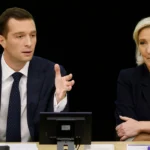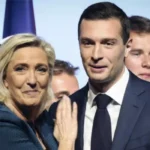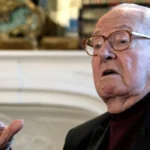Gerhard Fritz Kurt “Gerd” Schröder is a German lobbyist and politician. He served as chancellor of Germany from 1998 to 2005. He was also the Leader of the Social Democratic Party of Germany. Since exiting public office, Schröder has functioned for Russian state-owned energy companies, including Nord Stream AG, Rosneft, and Gazprom. In 2022, it was documented that Schroeder was disbursed nearly $1 million per year by Russian energy companies. Based on his political career, he later emerged as a staunch supporter of Russia and Putin.
After the 2022 Russian invasion of Ukraine, Schröder was condemned for his policies towards Vladimir Putin’s regime, his work for Russian state-owned enterprises, and his lobbying on behalf of Russia. On 1 March 2022, Schröder’s whole staff including long-time office manager Albrecht Funk relinquished due to Schröder’s associations with Russia and Putin directly. On 8 March 2022, the Public Prosecutor General commenced proceedings related to accusations against Schröder of collaboration in crimes against humanity due to his part in Russian state-owned corporations. The CDU/CSU group insisted that Schröder be included in the EU sanctions against individuals with ties to the Russian government.
He cultivated close relations with Yeltsin’s successor, President Vladimir Putin, in an endeavour to strengthen the “strategic partnership” between Berlin and Moscow, including the beginning of a gas pipeline over the Baltic Sea only between Russia and Germany. During his time in office, he visited Russia five times.
Schröder was slammed in the media, and thereafter by Angela Merkel, for calling Putin a “flawless democrat” on 22 November 2004, only days before Putin prematurely hailed Viktor Yanukovich during the Orange Revolution. In 2005, Schröder presented at the ceremonial introduction of the Airbus A380 in Toulouse that there was still “room in the boat” of EADS for Russia. Only a few days after his chancellorship, Schröder entered the board of directors of the Nord Stream joint venture, thus carrying about new speculations about his prior objectivity. In his memoir Decisions: My Life in Politics, Schröder still supports his friend and political ally, and comments that “it would be wrong to place unreasonable demands on Russia when it comes to the speed of domestic political reform and democratic development, or to judge it solely based on the Chechnya conflict.” Schröder’s continued close relationship with Vladimir Putin and his administration after his chancellorship has been widely criticized in Germany.
As chancellor, Gerhard Schröder was a substantial advocate of the Nord Stream 1 pipeline project, which intended to supply Russian gas directly to Germany, thereby avoiding transit countries. In 2005, Russian President Vladimir Putin’s buddy Schroeder hastily inscribed the deal just as he was departing the office from which he had been voted out days earlier. Within weeks, he began to oversee the project undertaking himself, leading Nord Stream AG’s shareholder committee.
In 2017, Russia appointed Schröder to also be an independent chair of the board of its biggest oil producer, Rosneft. At the time, Rosneft was under international sanctions over Russia’s part in the Ukraine crisis. Schröder conveyed to Blick that he would be paid about $350,000 annually for the part-time post. His decision provoked an outcry in Germany and abroad, particularly in a climate of fear about any possible Russian interference in the 2017 German elections. German Chancellor Angela Merkel condemned her predecessor, stating in August 2017: “I do not think what Mr Schröder is doing is okay.”
Moreover, During a heated disagreement between Russia and Estonia in May 2007 over the disposal of a Soviet-era war memorial from the centre of the Estonian capital Tallinn to a military cemetery, Schröder supported the Kremlin’s reaction. He stated that Estonia had contradicted “every form of civilised behaviour”. Therefore, the Estonian government withdrew a planned visit by Schröder in his position as chairman of Nord Stream 1 AG, which enabled the petroleum pipeline from Russia to Germany.






